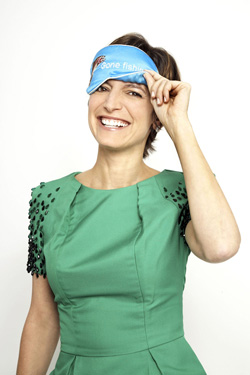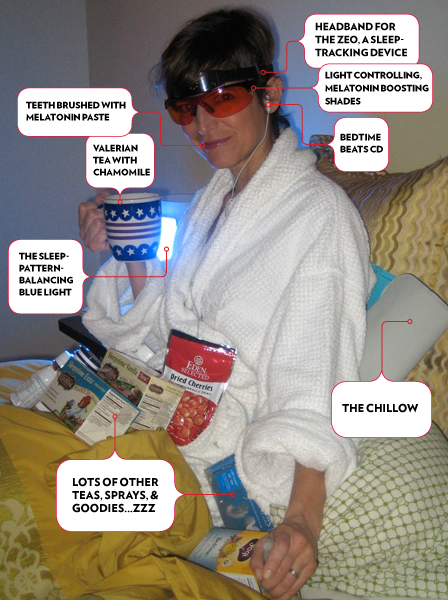
 Among the 972 weird things about sleep I didn't know until Arianna Huffington and I started the Sleep Challenge: There is a toothpaste that supposedly makes you sleep better. Also, sunglasses, smoothies, body patches, special sheets and even sleep-promoting cherries. Surprised? Not as much as I was when I found out that some of it actually works.
Among the 972 weird things about sleep I didn't know until Arianna Huffington and I started the Sleep Challenge: There is a toothpaste that supposedly makes you sleep better. Also, sunglasses, smoothies, body patches, special sheets and even sleep-promoting cherries. Surprised? Not as much as I was when I found out that some of it actually works.
My first introduction to the over-the-counter sleep-aid industry—expected to be a $750 million market in three years’ time, and that’s not counting the five billion dollars in drugs like Ambien—came shortly after we announced the Sleep Challenge. Suddenly, I was deluged with everything from "performance bedding" (special sheets made for athletes to sleep on) to books with drowsy-making titles like I Can Make You Sleep.
Now, I may not be the best tester of products like these: As someone who used to get by on five hours a night pre-Challenge, I was so chronically zonked that the only sleep aid I needed was a horizontal space at least 5’2” long, and it didn’t really need to be comfortable, either. (A lawyer friend of mine used to nap underneath her desk with her feet sticking out like the Wicked Witch, so I’m not the only one!)
But I realize that millions of people do need help falling asleep—and that in fact, the more sleep-deprived you are, the harder it sometimes is for you to rest well. Our nation of poorly rested women may really need this stuff! So I decided to bed-test some products. Not all of them, though. I eliminated:
But that left a lot of stuff. Ready? Here’s me:

Sexy, no? (No.) But everything here comes with some degree of scientific backup: the blue-light lamp supposedly rebalances the body's natural sleep rhythms; the toothpaste and the dried Montmorency cherries contain melatonin, which regulates sleep; and the Bedtime Beats CDs feature music with 60-80 beats per minute—a rhythm also found to promote sound rest.
My favorite things so far:
And what about melatonin? The supplements are popular; they work best if taken at least 1.5-2 hrs before sleep. But since most of us actually aren’t melatonin-deficient to begin with, you should only take .5 mg, says Dr. Breus (many supplements contain more). Also, because it’s a hormone, he warns, “I never recommend Melatonin to females under 18 years old with a developing menstrual cycle. Who knows what it may do.” Got it?
For me, the most effective way to get a better night’s sleep is still pretty simple and basic: Remember to go to bed, and do it roughly at the same time every night. But if any of the above help you sleep more deeply, go for it. (Just don’t do what I do and try melatonin, valerian tea and lavender spray all at once. Coma!)
Now it’s your turn. What sleep aids have you tried—or wanted to try?
More from glamour.com: